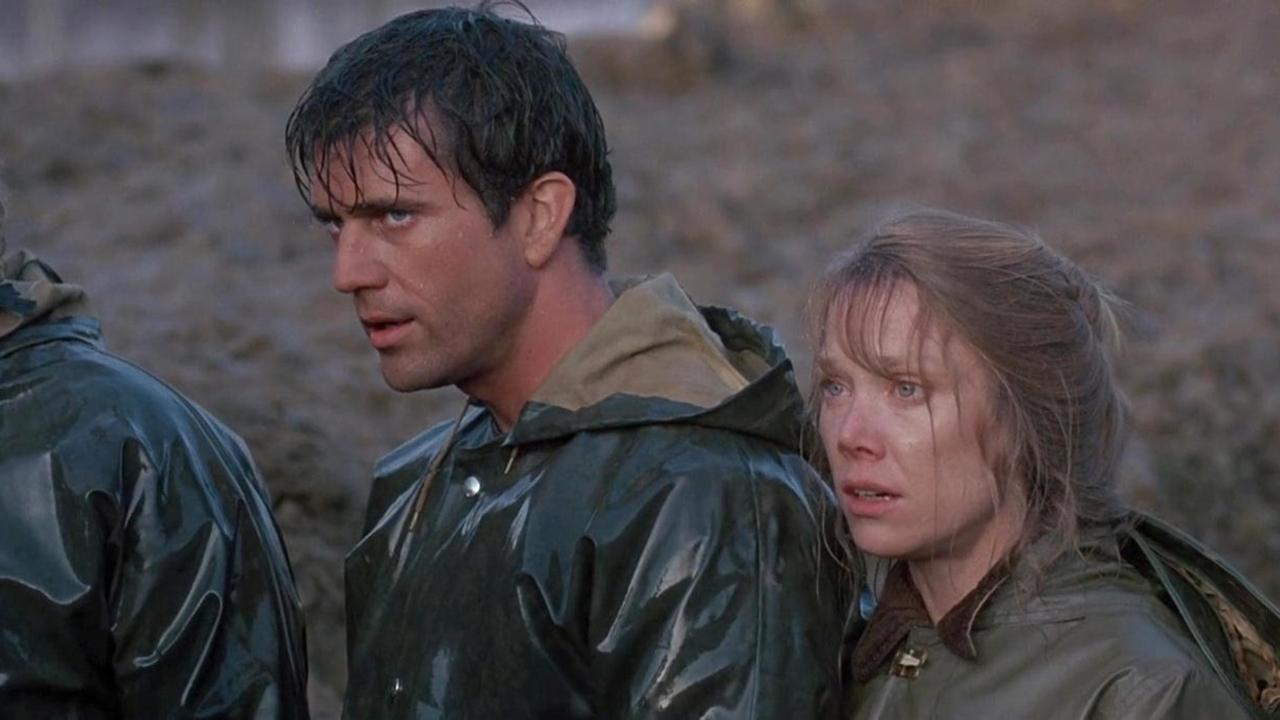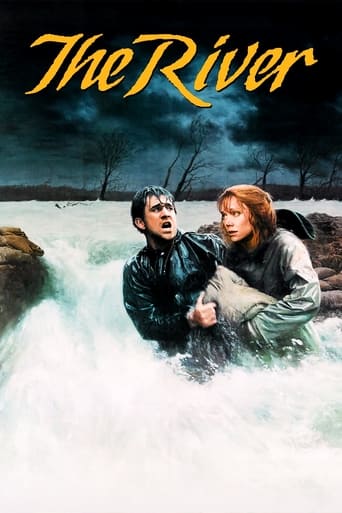Perry Kate
Very very predictable, including the post credit scene !!!
KnotMissPriceless
Why so much hype?
Erica Derrick
By the time the dramatic fireworks start popping off, each one feels earned.
Haven Kaycee
It is encouraging that the film ends so strongly.Otherwise, it wouldn't have been a particularly memorable film
moonspinner55
Mel Gibson isn't terribly convincing as a southern farmer and family man trying to hold onto his river-ravaged land; even when covered in soot and wearing overalls, everything about the young, wiry Gibson breathes prosperity. Corporate shady Scott Glenn (in a sleepwalking performance) wants Gibson and wife Sissy Spacek off their land in order to build a dam and flood the valley (it'll mean more jobs), but Gibson refuses to sell out. Sub-plot with Mel taking factory work (after crossing a picket line) is presumably meant to give us a more complete portrait of the man, but it just makes the character seem hard-headed. Upon opening with a lovely series of nature shots courtesy cinematographer Vilmos Zsigmond, director Mark Rydell immediately loses his footing with a sequence of contrived family action in a rainstorm (underlined by an awful John Williams score to heighten the drama, which has no pay-off). It's all downhill from there, with petulant, milky-skinned Gibson failing to match up with homespun Spacek, and two perky kids who keep playing to the camera. "The River" was released the same year as "Places in the Heart" and "Country", and was easily the weakest 'farm movie' of the lot. Glossy, superficial and dull. *1/2 from ****
tieman64
"I saw the weary farmer, plowing sod and loam. I heard the auction hammer, knocking down his home. But the banks are made of marble, with a guard at every door, and the vaults are stuffed with silver, that the farmer sweated for." - Pete Seeger Mark Rydell's "The River" stars Mel Gibson and Sissy Spacek as a pair of struggling farmers. Combating floodwaters, bankers, scheming capitalists and angry unionists, the duo desperately attempt to keep the family farm from foreclosure.John Steinbeck published "Grapes of Wrath" in 1939, turned into a film one year later by John Ford. In many ways, Rydell's film plays like a 1980s update of the aforementioned works. At its best, it conveys the insensitivity of power brokers and landowners, tests the assumptions about private property and class difference upon which our social order rests, and details the ease at which humans (with common interests and shared grievances) are divided into subsets and pitted against one another. Not as sophisticated as Elia Kazan's similarly themed "Wild River", "River" climaxes with our heroes saving their farm and "becoming rich". This hokey climax not only betrays the film's original ethos, but ultimately endorses the problems and pursuits it pretends to denounce. In "River", everything's fine so long as you make a profit at the end.Aesthetically, "River" offers a nice blend of 1980s Hollywood and early 20th century neo-realism. Part of a wave of big-budget "women's picture", and influenced by the ripples of second-wave feminism, the film features another wonderful performance from Spacek. Blending strength with fragility, beauty with plainness, her character endures the labours of motherhood, matrimony and agronomics. Mel Gibson, though photogenic, is miscast as Spacek's husband.7.9/10 – Underrated. See Ford's "Grapes of Wrath" and Ken Loach's "Bread and Roses".
SnoopyStyle
Tom (Mel Gibson) and Mae Garvey (Sissy Spacek) struggle to keep their farm afloat after a devastating flood. Joe Wade (Scott Glenn) has a scheme to build a dam to bring water to his land. To do it, he would need to buy out all the farmers including the Garveys. Tom needs a loan but Joe Wade has lined up the bank and political backers against them.It is the little guy struggling against the big guy. It is also about Tom's single-mindedness. Tom is not necessarily a sympathetic guy. He is stubborn beyond reason. He has a mean streak in him. This makes the simplistic movie structure of small-guy-makes-good not so simplistic. Sissy Spacek is able to soften him image somewhat. There are a couple of great scenes in the mix. The auction scene is the most memorable and heart breaking. The faces in the crowd says it all. The other is the strike. The ending of which is another great scene for a different reason. This starts out yet another small farmer struggle movie. In fact, it's the last of three big such releases of that year. It turns into a man obsessed against the river.
tenthousandtattoos
From the opening sequence, you can tell this is a movie that is going to take it's time to tell a story, to introduce, and take you into this world. What begins as a gentle rain shower turns into a flood, as we are introduced to the Garveys, rushing about with shovels and bags, and a bulldozer, trying to save their farm from the rising water. They've done this before, we see, as Mae Garvey (Sissy Spacek) hands her daughter the "good quilt" to take upstairs, and gathers family photos and other irreplacables, putting them out of harm's way upstairs, and as they head outside into the weather again, we see the flood waters lapping at the back steps.The farm has been in Tom Garvey's (Mel Gibson) family for generations, so he's reluctant to sell up and leave, especially because the offer to buy comes from Joe Wade (Scott Glenn), Mae Garvey's former beau, who wants to flood the whole area (in the name of the Almighty Dollar) to build a hydroelectric plant.But times are indeed tough, and the bank is reluctant to loan any more money, which Tom and Mae desperately need to stay afloat. In desperation, Tom takes a job at an iron-works, but doesn't know until he gets there that he's part of a group of "scabs" brought in to work while the contractors of the iron works are on strike. Ripped away from the idyllic river-front farm, he is unable to leave, lest the contractors see him doing so, and beat him to death without a second thought. 4.50 an hour. 50 hour week. 10 minute "p*ss break" every two hours...you do the math...that's hard work! Meanwhile, "back on the farm", Mae has her own problems in a scene that still grips my gut to this day: fixing a piece of farm equipment hundreds of metres away from the farm house, she gets her arm trapped in a cog-and-chain, and is unable to free herself, plus she starts bleeding from the wound, really badly. I wasn't expecting such a nail-biting scene in such a seemingly placid film. It was really well done.Not only that, but she has the renewed attentions of Joe Wade to deal with as he plays "knight in shining armour" to the injured Mae while Tom is stuck at the factory, and lets her know in no uncertain terms that he wants her back, using the "I can look after your kids better than Tom" argument to try to convince her. While obviously the "what could have been" crosses her mind, she loves her husband, and tells Joe to back off.The scenes between Gibson and Spacek are great. They have some real chemistry and raw emotions you rarely see in films these days. Mel does a great "tough-guy exterior" thing when Joe gives Mae a ride home from the store, but as he comes on to Mae afterwards in the kitchen, we can tell that although he's doing it coz he's attracted to her, he is also doing it because her old flame just gave her a ride home.All the performances are great, and very real, from the townsfolk shouting "no sale!" at the auction to the grimy iron works factory workers, to Tom and Mae's kids (Shane Bailey and Becky Jo Lynch), who give startlingly believable performances.This film is a quiet one best watched in the evening, and with the lights off...the velvety cinematography and rich John Williams score will enrapture you from the start to the moving final scene. Someone else on here commented that the photography is like a beautiful old oil painting...I couldn't agree more. Enjoy.

